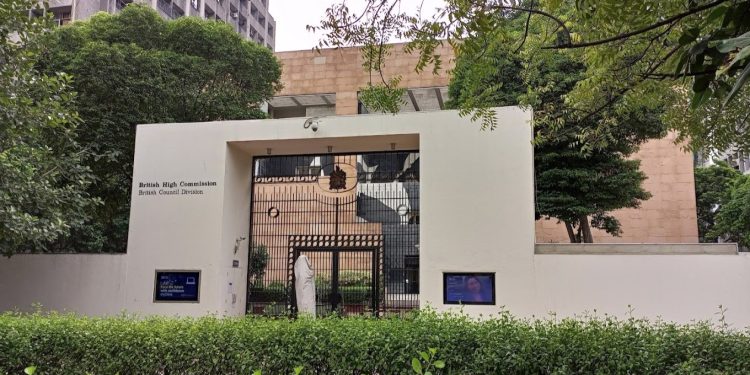Skilled professionals and students from India have voiced their apprehensions regarding the recent visa measures introduced by the UK government. The ban on family dependents has been labelled as “unfair” by these groups.
UK Home Secretary James Cleverly presented a five-point plan in Parliament on Monday, proposing restrictions such as prohibiting overseas care workers from bringing their families and imposing a higher minimum salary threshold of GBP 38,700 for skilled professionals.
Although the Health and Care visa will be exempt from the elevated salary requirement, there is uncertainty about how this category will apply to Indian medics.
Dr. Ramesh Mehta, the founder of the British Association of Physicians of Indian Origin (BAPIO), representing nearly 80,000 doctors and 55,000 nurses of Indian origin in the UK, stated, “We will be writing to the Home Secretary urgently to seek clarification. We hope that this does not include doctors and nurses because if it does, we can assure the Home Office that the number of doctors and nurses coming to the UK from India will be nil.”
Expressing concern over the potential impact of the UK government’s visa changes, especially regarding care workers, a representative emphasised the perceived unfairness of preventing them from bringing their families.
Highlighting the essential need for care providers to be with their families for effective service delivery, he underscored the potential challenges posed by such restrictions.
The British Association of Physicians of Indian Origin (BAPIO), actively collaborating with the National Health Service (NHS) to address its demand for qualified Indian doctors and nurses, issued a warning. They indicated a possible withdrawal of voluntary support if the new regulations restrict family rights, emphasising the importance of family cohesion for healthcare professionals.
Moreover, there is uncertainty regarding the exemption of professionals under the Health and Care visa from the compulsory Immigration Health Surcharge (IHS). The Home Office’s intention to potentially revoke this exemption adds to the concerns. Home Secretary James Cleverly confirmed an increase in the IHS from GBP 624 to GBP 1,035.
British Prime Minister Rishi Sunak defended the visa changes, citing the announcement as the largest-ever cut in net migration. To reduce migrant numbers by 300,000, the government asserts that these adjustments are necessary to address the current high level of net migration.
The Federation of Indian Chambers of Commerce and Industry (FICCI) has issued a warning under the Skilled Worker visa route, where Indian professionals have historically been predominant. FICCI expressed concern about the increase in the minimum salary threshold from GBP 26,200 to GBP 38,700, cautioning that it could lead to “unintended consequences” for the UK economy.
According to FICCI Secretary General Shailesh Pathak, the heightened salary requirement may deter highly skilled Indian professionals, particularly in IT, engineering, and research, from choosing the UK. This, in turn, could dissuade Indian companies operating in the UK, impacting both British and Indian professionals employed by these companies.
Pathak emphasised that Indian professionals have been crucial in addressing skill shortages in the UK, and any decline in their contributions could negatively impact innovation and economic growth in the British economy.
In the realm of international students, a category dominated by Indians, concerns arise regarding a new review by the Migration Advisory Committee (MAC) of the Graduate route visa. This visa allows graduates to stay for up to two years after completing their degree to gain work experience.
The National Indian Students and Alumni Union (NISAU) UK, a staunch advocate for post-study visas, has urged the Migration Advisory Committee (MAC) to address the concerns of Indian students regarding the review of the Graduate route visa.
NISAU emphasised the necessity for MAC’s engagement on this “topmost requirement of Indian students” and urged a focus on combating the mis-selling of the scheme by unscrupulous agents.
Sanam Arora, founder-chair of NISAU UK, expressed bewilderment at the current situation, noting that while countries like Canada and Australia have enhanced their in-study and post-study working offers, the UK faces uncertainty.
Arora highlighted the economic potential of international graduates in addressing skills gaps and fostering economic growth, particularly amid challenges such as inflation and low productivity in the UK.
Enrollment from India has already seen a significant decline this year, partly attributed to restrictions on bringing dependents, causing hardships for UK universities. The Indian National Students’ Association (INSA) UK pledged to address these changes with UK authorities, advocating for fairness for Indian students.
INSA UK President Amit Tiwari expressed concern that Indian students in the UK are unfairly targeted due to party politics, emphasising the financial dependence of UK universities on funds from foreign students.
The Home Office has announced upcoming changes that will impact international students, including the removal of the right to bring dependents for most courses, except postgraduate research courses. Additionally, the ability for international students to switch to work routes before completing their studies will be eliminated. These changes are set to be implemented for courses commencing in January 2024.
The Conservative government, led by Rishi Sunak, is facing pressure to reduce record-high immigration statistics as the country approaches a general election year in 2024.











